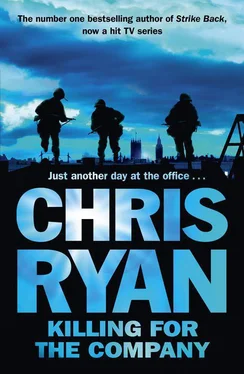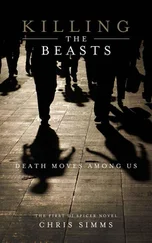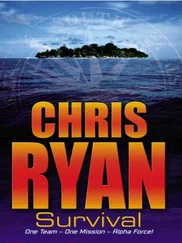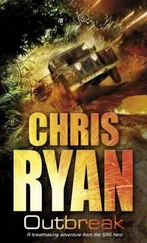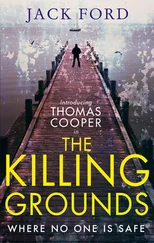And as Chet turned left out of his road, his mind was ablaze with questions. Who was she? How did she get into his flat? And why the hell had she just tried to kill him?
05.00 hrs.
Just under an hour till dawn. Luke and Finn could see the Bedouin village up ahead.
They’d approached slowly, keeping the engine noise to a minimum. In the distance they had seen the lights of what they assumed to be Iraqi border patrol vehicles. If they were discovered by one of these, things could get messy. But the desert was big and they were small. Nobody saw them.
Now they had left the car and were approaching on foot. They were on a dusty track that bore tyre marks but also animal footprints. On either side the terrain was dotted with boulders and low brush. Five minutes after they left the Toyota they passed a rusting car chassis. God knows how long it had been there. Years, probably.
Finn had changed out of his burka and into grubby gear much like Luke’s. They had both used the cover of darkness to double-check the gear packed away in their ops waistcoats that were hidden under their dishdashes: magazines for their pistols, grenades, Plasticuffs. Their disco guns were fitted to their ankles, but their main weapons were closer at hand. They had each looped a piece of bungee cord in a figure of eight around the butt of their carbine, then threaded this around their arms so the weapon itself was hanging underneath their armpits — well disguised by the dishdash but accessible in a split second. With luck, they’d be in and out, but they didn’t know what was waiting for them up ahead, so they had to be prepared. And that meant packing some heavy shit.
Within ten minutes of leaving the car, they could see the outskirts of the village. They checked it out through the kite sight. It was a poor place — a seemingly random agglomeration of about twenty breeze-block houses, each a single storey high and with a shallow-sloping corrugated-iron roof. About 200 metres from the outermost of the houses was the shell of an older dwelling. The blockwork had crumbled, there was no roof and an old acacia tree, heavy under its own weight, had grown through one of the walls. Luke pointed at it. ‘We’ll set up an OP there,’ he said.
Finn nodded and together they headed for the derelict house. They were ten metres away when there was a sudden movement. Both men instinctively went for their weapons, only to see a beady-eyed goat scramble to its feet and put a few metres between itself and them. The bell round its neck gave a repeated dull clunk as it moved, and its breath steamed as it watched them make their way into the OP. The ground was covered with rubbish — old tins, rusting jerrycans and sturdy branches from the acacia tree. A gap in one wall where a window used to be formed a perfect place from which they could observe the village, and Finn took up position here. He pulled an A4 photograph and a pencil-thin red-filtered torch from under his robe. It was a satellite image of the tiny village. Each house was easily identifiable — there were twenty-two in total, and they were mostly set in a rough circle around a central courtyard — and one of them had been circled in black marker. This, if their intelligence was correct, was where they would find Abu Famir.
The two Regiment men examined the image together. Within seconds they had identified their OP, which was on the southern edge of the village, just east of the track leading into it. Their target location was on the north-eastern edge of the village, backed by an area of low brush and with a solitary tree growing about ten metres behind. Finn handed the photo to Luke, before bending down with his kite sight and scanning the darkness.
‘I’ve got eyes on,’ he said after a minute. He stood back so that Luke could have a look.
It took Luke about thirty seconds to take everything in. The central courtyard was about forty metres wide and littered here and there with large objects that were difficult to make out from this distance. The shell of another abandoned car? A collection of disused oil drums? Wandering around these objects were a number of animals — more goats, Luke assumed. The tree that they had noted on the satellite image was easy to make out; just beyond it Luke could see the target house. It was no different to any of the others: just a poor, blockwork dwelling with no windows and an iron roof.
Luke stepped back from the kite sight. ‘We wait till first light,’ he said. ‘Then we move in.’
Finn nodded, and went back to surveying the village through the kite sight.
Within less than twenty minutes the cold, grey light of dawn was starting to push back the inky night sky. Luke and Finn were ready. This was the best time to lift their target. It was dark enough to give them a bit of cover if they needed it, early enough for nobody to be about, and sufficiently late that any noise they made wouldn’t cause alarm. As they’d been waiting, a couple more goats had wandered up to the OP. That could be to their advantage. Luke selected a thin, sturdy acacia branch, about a metre long. If he could use that to guide a few goats into the village, they would look like Bedouin wanderers.
They stepped out from the OP. Three goats had congregated about ten metres away. Luke approached slowly, making a clicking sound in the corner of his mouth. One of the goats bolted, its bell jangling noisily as it disappeared into the night; but the remaining two lingered. The musty smell of the beasts and their shit reached Luke’s nose; when he tapped one of them firmly on its haunch, it made a shuddering sound. Another tap and both animals started wandering in the direction of the village.
A thick silence surrounded them — a silence in which the clanking of the goats’ bells and their own footsteps sounded deafening. Luke brandished his acacia branch firmly, but he also kept his left arm loosely by his side, ready to access his carbine. But at the moment there was nobody around. The goats in the central courtyard gazed at them curiously as the two SAS men stood at the edge of the settlement and looked in. The object Luke had seen through the kite sight was indeed the deserted chassis of an old car; and as they ventured further in, he could feel some residual warmth from the oil drums. Clearly someone had lit a fire in them the previous night.
Thirty metres to the target. Luke tapped one of the goats, and the men walked side by side past the oil drums and towards the building where they hoped to find Abu Famir.
From the corner of his eye, Luke sensed movement.
Somebody had appeared from one of the houses at their ten o’clock, no more than twenty metres away. Luke looked closely at the figure. It was a boy, no more than twelve years old, though his face already bore the ravages of a hard life. His body did too. The bottom half of his left leg was missing and he was able to stand only with the aid of a sturdy stick nestled under his left armpit. He wore a heavy cloth robe and a brightly coloured hat, and in his right hand he was carrying a metal bucket. He stared at the two strangers with wide eyes full of mistrust.
‘You clocked the kid?’ Luke murmured.
‘Roger that,’ replied Finn.
As he spoke, there was more movement. The door of the target house — distance, twenty-five metres — was opening.
Then — fuck! Four figures emerged from the house. They were all wearing plain Arabic dress, though one was a lot older than the others. He had a short white beard and little round glasses, and Luke immediately recognised him from pictures he’d seen: Abu Famir. The man’s eyes darted around.
As they exited the building, the younger men surrounded the Iraqi academic. They were not quite so dark of skin, and they each carried an MP5 Kurz. They made no attempt to hide their weapons and held them like they knew how to use them. Abu Famir had good reason to seem on edge: it looked like Saddam’s men had already caught up with him.
Читать дальше
